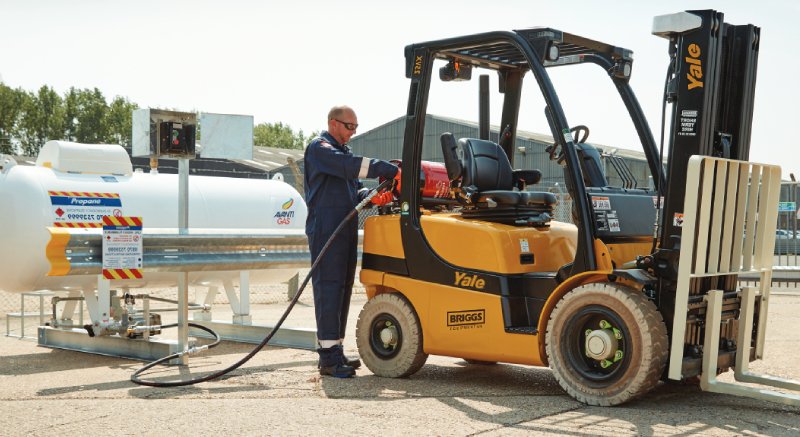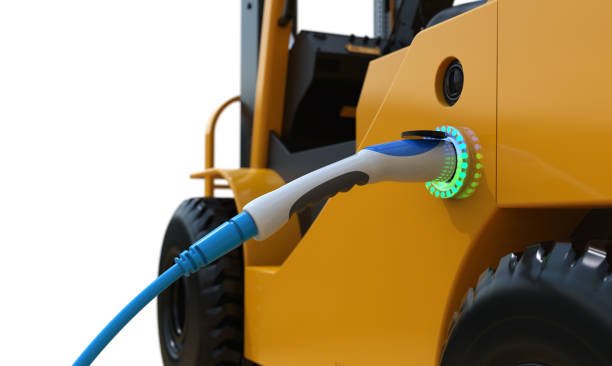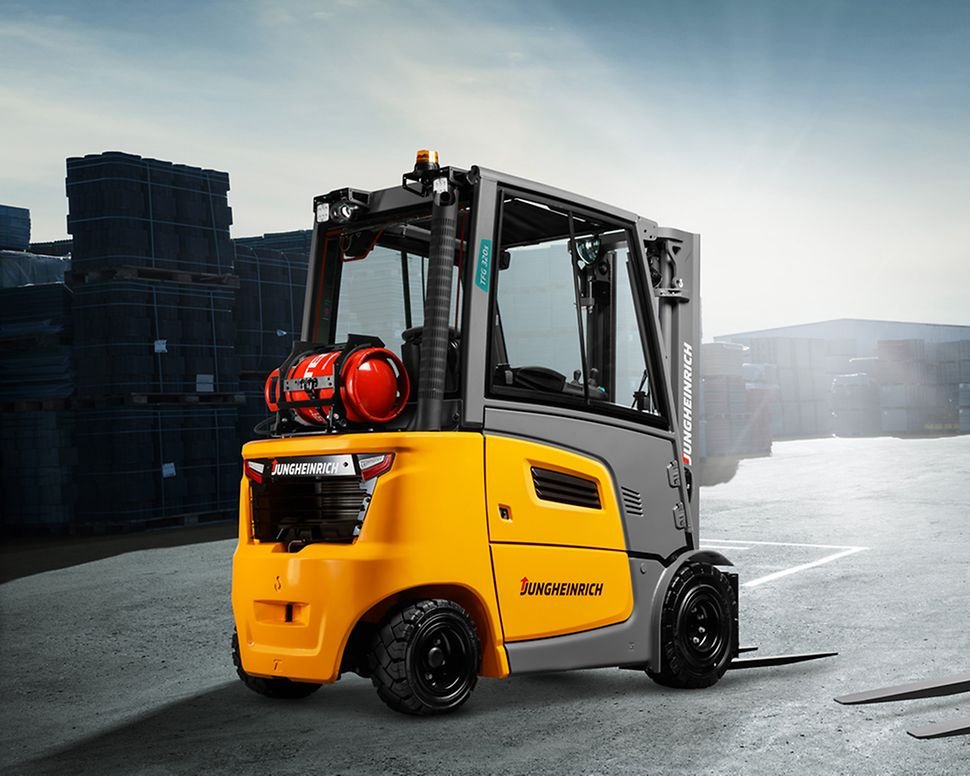In today’s world, efficiency and sustainability are very important. So, knowing about different types of forklifts, including Internal Combustion (IC) forklifts and their fuel sources, including the relevant forklift fuel type, is essential for businesses. Forklifts can be electric, propane, or diesel. Each type has its own pros and cons. By learning about these forklift fuel options, you can make better choices for your operations. This will help you think about things like indoor air quality and other operational needs.

Exploring Forklift Fuel Options
Forklifts are essential in handling materials. They come with different fueling options. Each option fits specific needs and work areas. Picking the right fuel type can change a company’s productivity. It can also affect costs and the environment.
This article will look at the most common types of forklift fuel, including electric, liquified petroleum gas (LPG or propane), compressed natural gas (CNG), and diesel. We will help you find the best choice for your business. We will discuss the pros and cons and check how each option affects the environment. You’ll get the info you need to make a smart decision.
Overview of Electric, Propane, and Diesel Forklifts
Electric forklifts are popular because they are good for the environment. They use rechargeable batteries instead of fossil fuels. This means they emit no harmful gases, which makes them perfect for indoor spaces where air quality matters. Electric forklifts are quieter too, helping to keep warehouses and work sites from being too noisy. Additionally, operator ergonomics are enhanced due to the reduced noise and vibration levels.

On the other hand, the benefits of lp forklifts with propane engines offer a good mix of strong performance and eco-friendliness. They run on liquid propane gas, which is a cleaner burning option than gasoline or diesel. Propane forklifts are flexible and work well both inside (with good ventilation) and outdoors.
If you need to lift heavy loads and work outside, a diesel forklift may be the best choice for you. Diesel forklifts are known for being powerful and tough and designed specifically for outdoor use. They can manage hard jobs and rough conditions. However, they do release emissions, including vapors, so it’s best to use them outside or in a poorly ventilated area with proper ventilation.
The Role of Hybrid Technologies in Modern Forklifts
Advancements in forklift technology have led to new hybrid models, including hydrogen forklifts designed for narrow aisles. These models combine different fuel sources’ benefits. Hybrid forklifts often have features like regenerative braking and better engine management. This makes them more energy-efficient and helps cut down emissions.
Hybrid forklifts are a great choice for businesses that want to reduce their impact on the environment. They do this without losing performance. These forklifts offer more flexibility for different work settings.
Also, using hybrid forklifts means businesses rely less on a single fuel source. This can result in less maintenance and cost savings over time. As technology moves forward, hybrid forklifts will likely become more important in material handling.
Deep Dive into Electric Forklifts
Electric forklifts and IC forklifts are becoming popular options for many businesses. This is especially true for those that work mainly indoors or focus on being environmentally friendly. They run on rechargeable batteries and offer many different advantages and benefits. These benefits help create a cleaner, quieter, and possibly cheaper way to operate.

Electric forklifts provide lower emissions and reduced costs for running them. These factors make them appealing for warehouses and industrial facilities. Let’s look at the specific advantages they give to businesses in Texas. We will also discuss important topics like battery care and charging options.
Benefits of Going Electric for Texas Warehouses
Texas businesses, especially those using indoor warehouses, are finding many benefits from adding electric lifts to their fleets. Electric forklifts are not just modern and eco-friendly; they also offer strong performance, save money, and show a commitment to being responsible for the environment.
One big benefit of electric forklifts is how they improve indoor air quality. Without tailpipe emissions, they help make the workplace healthier for employees. This means less exposure to harmful pollutants and better overall health. This is very important in closed spaces like warehouses where there may not be good ventilation.
Electric forklifts also provide help with long-term cost savings. While the higher upfront cost might seem a bit more compared to some internal combustion models, they can save a lot over time due to their lower total cost of ownership. Lower upfront cost, fuel, and maintenance costs can lead to good savings for the forklift’s life. Electric lifts and lift trucks are very energy-efficient, and using electricity is usually cheaper than fuel, making it easier to predict operating expenses.
Charging Solutions and Battery Maintenance Tips
Transitioning to electric forklifts means you need to know about charging solutions and battery care. This knowledge helps keep the forklifts running well and lasting longer. New battery technology has made charging faster and run times longer. This makes electric forklifts better for tough jobs.
There are different types of chargers now. You can use regular plug-in chargers, or you can opt for opportunity chargers. These allow you to charge the batteries during short breaks or when shifts change. The best charger for you will depend on what your operation needs and what your facility can handle.
Caring for the batteries is key. Good battery maintenance helps you get the most out of your electric forklifts. By cleaning, inspecting regularly, and charging correctly, you can make the batteries last longer. This will boost performance and give you longer run times.
Understanding Propane-Powered Forklifts
Propane-powered forklifts are widely used in the material handling industry. They provide a great mix of performance, flexibility, and good costs. Their ability to work well in a greater variety of environments—both inside and outside, and with options like pneumatic tires—makes them a top pick for many fields.
In this part, we will look at why propane is still a favorite for many businesses in Texas. We will also think about the safety and efficiency of these strong machines.
Why Propane is a Popular Choice in Texas
Texas has many different industries and tough work settings. This creates special challenges for forklift operations. Propane forklifts are reliable and flexible, making them a popular choice for Texas businesses. They can handle a variety of tasks very well.
One main reason why propane forklifts are popular in Texas is their great versatility. Unlike electric forklifts, which can struggle in outdoor spaces or uneven ground, propane forklifts, running on liquid petroleum gas, perform well in different conditions. They can easily navigate busy warehouse aisles or move around in construction sites.
For propane forklift operators, a big plus is how easy and fast refueling is. Electric forklifts can take hours to charge, but larger forklifts with propane fuel tanks can be changed quickly. This cuts down on downtime and helps keep productivity high. This ease is vital in fast-moving work areas where time matters.
Safety and Efficiency Considerations for Propane Forklifts
Propane forklifts have many benefits, but it is very important to think about OSHA safety and efficiency for their proper use. By following correct handling steps and using features that boost efficiency, businesses can enjoy all the advantages of these machines while keeping safety a priority, especially when considering the weight limit of propane cylinders which should not exceed 45 lbs.
Safety begins with knowing how propane works and sticking to safe handling and storage rules. Keeping propane tanks secured, stored in places with good airflow, and checked often can greatly reduce any risks.
Newer propane forklifts usually have catalytic converters. These help lower harmful emissions and make the equipment run better. They change harmful pollutants into safer ones, which helps protect the environment.
Here are some important safety tips for using propane forklifts:
- Ventilation is Vital: Always have good airflow when using propane forklifts inside to stop carbon monoxide from building up.
- Regular Inspections: Check propane tanks often for leaks or damage, making sure they are well attached to the forklift.
- Safe Refueling: Follow safe refueling methods by using special refueling areas and sticking to the maker’s rules.
The Case for Diesel Forklifts
When it comes to heavy lifting, harsh environments, and tough work schedules, diesel forklifts are the best choice. They are known for their strength, long-lasting nature, and ability to handle hard conditions. This makes them very important in fields like construction, lumber, and heavy manufacturing.

Yet, with these benefits, we also need to think about the environmental impact of diesel forklifts. In this part, we will look at how diesel forklifts perform well while also considering their effects on the environment. We will explore ways to lessen any issues that can come up.
Performance and Durability in Tough Working Conditions
Diesel engines are known for their strength and toughness, and diesel forklifts are the same. They work best in tough places where heavy loads, rough ground, and long hours are normal. These forklifts are made to handle the demands of hard industries.
A big reason for their strong performance is that they use diesel fuel. Diesel fuel has more energy than propane or gasoline, which means more power for every gallon used. This makes diesel forklifts great for tasks that need high torque and heavy lifting.
Besides their power, diesel forklifts are famous for being durable, including reputable brands like Toyota. They are made with strong parts and solid designs. This allows them to handle tough working conditions, such as extreme temperatures, dust, and uneven ground. That’s why they are a dependable choice for industries like construction and lumber.
Evaluating the Environmental Impact of Diesel Forklifts
While diesel forklifts offer exceptional performance and durability, evaluating their environmental impact is crucial in today’s sustainability-conscious world. Diesel engines, by nature, produce emissions, including carbon dioxide (CO2), a major contributor to greenhouse gases, and carbon monoxide (CO), a harmful pollutant.
In recent years, manufacturers have made significant strides in reducing the environmental impact of diesel forklifts by incorporating technologies like diesel particulate filters (DPFs) and exhaust gas recirculation (EGR) systems. These technologies aim to capture and reduce particulate matter and nitrogen oxide emissions.
| Emission | Impact | Mitigation Measures |
| Carbon Dioxide (CO2) | Greenhouse gas, contributes to climate change | Engine efficiency improvements, alternative fuels |
| Carbon Monoxide (CO) | Toxic gas, harmful to human health | Catalytic converters, engine tuning |
| Nitrogen Oxides (NOx) | Contributes to smog and acid rain | Exhaust gas recirculation (EGR), selective catalytic reduction (SCR) |
| Particulate Matter (PM) | Respiratory irritant, contributes to haze | Diesel particulate filters (DPFs) |
Key Takeaways: Forklift Fuel Options for Texas Warehouses
In conclusion, it’s important to know the different fuel types for forklifts. This knowledge helps improve operations in Texas warehouses. Electric forklifts are efficient and can save money, especially when you think about charging solutions and battery care. Propane is still a popular choice for its safety and efficiency. Diesel forklifts are strong and last a long time, even in tough situations. Each fuel type has its benefits. Choosing the right one will depend on your work needs and its effect on the environment. Looking into hybrid options can also help make forklift operations more sustainable. Make a smart choice based on what you need to boost productivity and lower costs.
Frequently Asked Questions
What are the main differences between electric, propane, and diesel forklifts?
Electric, propane, and diesel forklifts mainly differ in their fuel type. This difference affects where and how you can use them. Electric forklifts do not produce emissions and work well indoors, while propane forklifts have some cold-weather disadvantages compared to electric models. Diesel forklifts are great for outdoor operations because they provide more power.
How do I choose the right fuel type for my forklift in Texas?
To pick the right fuel type for your forklift, you need to look at your needs. Think about things like whether you will use it indoors or outdoors, how much weight it needs to lift, and the costs involved, especially if you plan to operate in large open spaces. Next, consider the good and bad sides of using propane, diesel, or electric options based on what you find.
Can propane forklifts be used indoors in Texas warehouses?
Propane forklifts can be used inside if there is enough ventilation. This helps to keep the air quality safe. To lower the chances of carbon monoxide build-up, install carbon monoxide detectors and follow safety rules.
What are the long-term costs associated with each type of forklift?
Long-term costs can be different. Electric forklifts usually have lower costs for fuel and maintenance. Propane has moderate costs. Diesel, on the other hand, can have higher fuel costs.
Are there any tax incentives or rebates for using eco-friendly forklifts in Texas?
There are different tax benefits and rebates for eco-friendly forklifts. You can look into federal tax credits for electric forklift battery investments. Also, some states have their own programs that could help you save money. It’s a good idea to reach out to local agencies to find out what incentives are available.
